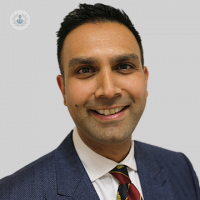FAQs about haemorrhoids
Escrito por:Leading consultant colorectal surgeon Mr Amit Patel is here to answer some of patients’ most common questions about haemorrhoids, including what causes haemorrhoids and how often they recur.

Why do people get haemorrhoids?
Haemorrhoids are abnormal dilated blood vessels within the anal canal.
Any increase in persistent intra-abdominal pressure can cause these blood vessels to dilate. Common triggers include:
- pregnancy
- childbirth
- chronic cough
- persistent lifting
- heavy exercise
It’s important to be aware that you might have dilated blood vessels without noticing. Haemorrhoids only become a problem when they are symptomatic , and you should certainly see a doctor if you are getting pain or blood in your stool.
Is anal bleeding always a sign of haemorrhoids?
Anal bleeding is actually a common phenomenon, and is not always attributable to benign conditions such as haemorrhoids. Other causes of anal bleeding can include:
- Anal fissures – there are ulcers or linear abrasions within the anal canal.
- Diverticular disease – a wear and tear condition of the lower bowel, related to a lack of fibre in your diet or inflammation of the lower bowel.
- Inflammatory bowel disease – a chronic condition which can cause severe abdominal pain and chronic diarrhoea.
- In rare cases, anal or rectal cancer.
It is vitally important to see the doctor for an examination and get a diagnosis.
Can you have recurring haemorrhoids?
It is a feature of haemorrhoids that they are often intermittent and can wax and wane. There can often be a cyclical pattern where patients can have periods of relative ease with their haemorrhoid symptoms followed by a more flared up condition.
Some patients may notice that they have a particular flare-up after childbirth, they then may have no such problems for another 20 or 30 years. Typical factors which contribute to a flare-up include straining a stool, persistent lifting and chronic cough.
Patients who are able to manipulate their toileting technique, and adjust their dietary intake or fluid intake, can help to manage their symptoms.
How often do haemorrhoids recur?
Recurrence rates for haemorrhoidal disease following haemorrhoidal intervention is widely varied in its reporting in the literature.
It's important to know that the vast majority of haemorrhoidal disease cases can be managed in the community by your doctor. The cornerstone of management includes:
- adjustment of toileting techniques to avoid straining of stool or spending prolonged periods of time at the toilet
- usage of laxatives to assist with stool consistency and again to avoid straining
- avoiding contributing factors such as chronic persistent lifting or heavy exercise
Occasionally, despite these measures, symptoms may persist, recur or become more problematic. In these instances, it would be appropriate for your doctor to refer into the hospital for specialist opinion. The hospital assessment would include excluding any other course for the bleeding from back passage, as well as discussion regarding surgical interventions for haemorrhoidal disease.
Options for surgical intervention are now quite varied . They are also less invasive, and they involve less postoperative pain and a faster recovery. Recurrence rates associated with the newer, more minimally-invasive techniques are similar to the more traditional forms of haemorrhoid surgery. When you combine this with the lower morbidity rates involved, minimally-invasive treatments are generally much more attractive to patients seeking surgical intervention.


